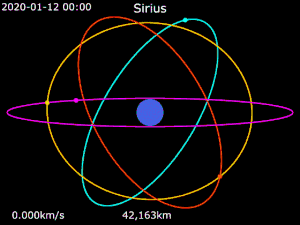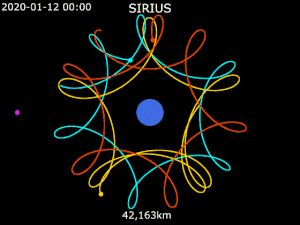Sirius FM-2
Sirius FM-2, also known as Radiosat 2, was an American communications satellite which was operated by Sirius XM Radio, previously Sirius Satellite Radio. It was constructed by Space Systems Loral and was based on the LS-1300 satellite bus. Launch occurred on 5 September 2000, at 09:43 GMT. The launch was contracted by International Launch Services, and used a Proton-K/DM3 carrier rocket flying from Site 81/23 at the Baikonur Cosmodrome.
| Mission type | Communication |
|---|---|
| Operator | Sirius Sirius XM Radio |
| COSPAR ID | 2000-051A |
| SATCAT no. | 26483 |
| Mission duration | Planned: 15 years; Achieved: 15-16 years |
| Spacecraft properties | |
| Bus | LS-1300 |
| Manufacturer | Loral |
| Launch mass | 3,800 kilograms (8,400 lb) |
| Start of mission | |
| Launch date | 5 September 2000 |
| Rocket | Proton-K/DM3 |
| Launch site | Baikonur 81/23 |
| Contractor | ILS |
| End of mission | |
| Disposal | Disposal orbit |
| Deactivated | 2016 |
| Orbital parameters | |
| Reference system | Geocentric |
| Regime | Tundra |
It was operating in a tundra orbit, from where it provided satellite radio communications services to North America. It had an expected operational lifetime of 15 years.
In 2016, the satellite was moved into a disposal orbit and decommissioned.[1]
Animation of Sirius's orbit
See also
References
- Meyer, James E.; Frear, David J., eds. (2 February 2017). Sirius XM Holdings Inc. 10-K Feb. 2, 2017 11:57 AM. Seeking Alpha (Report). Sirius XM Holdings Inc.
- Krebs, Gunter. "Sirius FM1, FM2, FM3, FM4 (Radiosat 1, 2, 3, 4)". Gunter's Space Page. Retrieved 2009-05-02.
- McDowell, Jonathan (2000-09-07). "Issue 434". Jonathan's Space Report. Archived from the original on 2016-03-03. Retrieved 2009-05-02.
This article is issued from Wikipedia. The text is licensed under Creative Commons - Attribution - Sharealike. Additional terms may apply for the media files.


